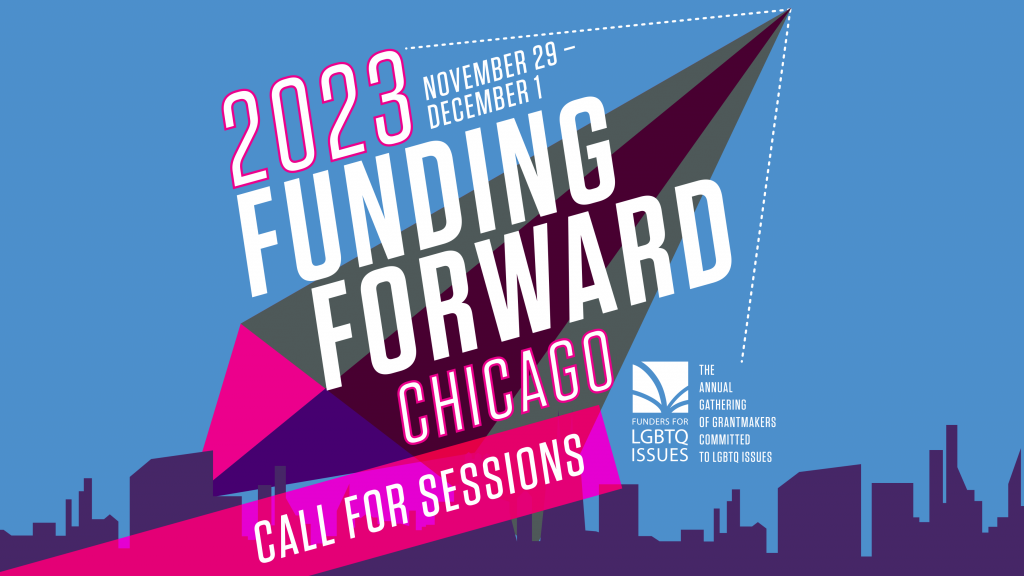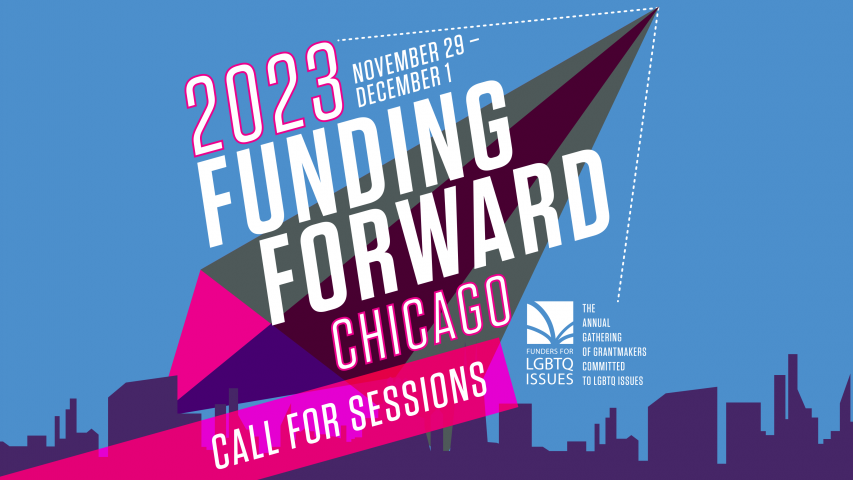
Funding Forward 2023 • Call for Sessions Open!
Funding Forward 2023 • Call for Sessions Open!
By: April Bethea on March 16, 2023
Funders for LGBTQ Issues is proud to announce that Funding Forward 2023 is coming to Chicago from November 29-December 1, 2023! The annual gathering of grantmakers committed to LGBTQ issues provides an exciting opportunity for funders to connect, learn, coordinate efforts, and maximize impact.
We are currently accepting session ideas from funders and philanthropic organizations who are members of Funders for LGBTQ Issues. Proposals will be reviewed by our planning committee. Member foundations and affinity groups are strongly encouraged to partner with one another to pool creativity and expertise and share the financial responsibilities of session sponsorship. The Call for Submissions deadline has been extended to Friday, May 26th, EOD.
Please Note: In light of the cruel and draconian legislative attacks on trans and gender nonconforming (TGNC) communities we have seen in the last year, and continue to see with increased regularity and severity, we are prioritizing conference sessions focused on trans lives this year. While we will consider all submitted session proposals, in this moment of crisis we strongly encourage our network to adopt an intersectional approach for their broader session proposals and consider how they can center TGNC communities.
Session Criteria
Proposals are your opportunity to suggest a topic, format, and presenters for an engaging session. Priority will be given to ideas that:
- Mobilize philanthropy to improve the lived experience of the broad diversity of LGBTQ people.
- Catalyze increased resources for local and regional advancement of a range of LGBTQ issues.
- Advance racial, economic, and gender justice for all LGBTQ people through an intersectional approach.
- Provide practical recommendations for funders interested in expanding or shifting their grantmaking.
Topics of interest suggested but are not limited to
- LGBTQ communities in Chicago and throughout the Midwest
- Responding to current political attacks including Title VII challenges, the rolling back of healthcare access for transgender people, and religious exemptions
- Gun violence and LGBTQ people, as well as larger safety and security for our communities
- Voting rights, the Census, and other civic engagement issues affecting LGBTQ communities.
- Gender justice, feminism, and the leadership of women of color in LGBTQ and intersecting movements
- Immigration and LGBTQ communities
- Aging in queer and trans communities
- Increasing resources for trans and nonbinary people
- Addressing the criminalization of LGBTQ people of color
- HIV and AIDS in LGBTQ communities
- Wellness, healing justice, safety, security, and mental health of LGBTQ people in the current cultural and political environment
- Intersectional advocacy and movement building
- Economic issues affecting LGBTQ people, including employment and economic opportunity as well as housing and homelessness
- Addressing underfunding of bisexual, intersex, and asexual communities
- Education and school climate issues
Session Formats
Funding Forward seeks to balance informative panels, multimedia presentations, and interactive conversations. We encourage proposals that offer alternatives to the traditional panel structure. Note that plenary sessions will be 1 hour and breakout sessions will be 1.5 hours. All sessions must include a funder speaker. Below are sample session structures. Feel free to propose your own creative structure, whether it be for a plenary or a concurrent breakout session.
Plenary Session
Goal: To inform your colleagues, showcase different approaches to resourcing issues or communities, and generate creative thinking among participants.
Structure: These 1-hour sessions typically consist of no more than three dynamic speakers framing issues, sharing stories of their work, showing multimedia clips, and/or dialoguing with each other. We strongly encourage creative structures and ways to generate audience participation. All plenaries must be moderated by a funder.
—
Open Discussions and Caucuses
Goal: To share experiences and make peer connections.
Structure: These 1.5 hour concurrent sessions create space for facilitated discussion on issues, strategies, or challenges identified by participants. We suggest that 2-3 presenters frame the topic very briefly and pose generative questions to the group. At least one speaker must be a funder.
—
Hands-On Workshop
Goal: To provide participants with new skills or tools that can be applied to their work.
Structure: These 1.5 hour concurrent sessions are built around small-group discussions or hands-on exercises involving problem solving, role playing, or simulations. Participants leave with practical skills or tools. At least one presenter must be a funder.
Qualities of a Successful Proposal
✔ Engaging and interactive, limiting formal presentations, and creatively using alternative formats.
✔ Includes multi-disciplinary perspectives from a mix of presenters who are grantmakers, activists, people working in the field, researchers, and others.
✔ Amplifies the voices of people of color, people from the Midwest, and trans, intersex, bisexual people, and/or sex workers.
✔ Provides practical tools for grantmakers navigating the inherent challenges of philanthropy to better serve our diverse LGBTQ communities.
Planner’s Logistical and Financial Responsibilities
All members of Funders for LGBTQ Issues are eligible to submit proposals. Session sponsors are responsible for covering the financial costs of the session and for collaborating with Funders for LGBTQ Issues to plan the session.
Responsibilities include:
- Covering expenses and making arrangements related to speakers’ travel and lodging. Note that Funders for LGBTQ Issues will cover the registration costs of 3 non-funder speakers per plenary and 2 non-funder speakers per concurrent session. The session sponsor will cover the registration cost of any additional approved speakers.
- Covering and coordinating all session-related expenses (e.g., translation/interpretation services and any printed materials).
- Inviting and prepping speakers (includes holding at least one conference call with your panel and Funders for LGBTQ Issues staff).
- Informing speakers of Funding Forward non-solicitation policies, and if applicable, other strategies to build relationships with funders in the conference space.
Funders for LGBTQ Issues staff are available to discuss proposal ideas. We encourage you to contact Program Director, Cleopatra Jach (Sir, Her), at [email protected] to talk through your session proposal before submission. Once a proposal is accepted, staff and planning committee members will work with you to approve speakers and ensure the session fits well with the entire program.

